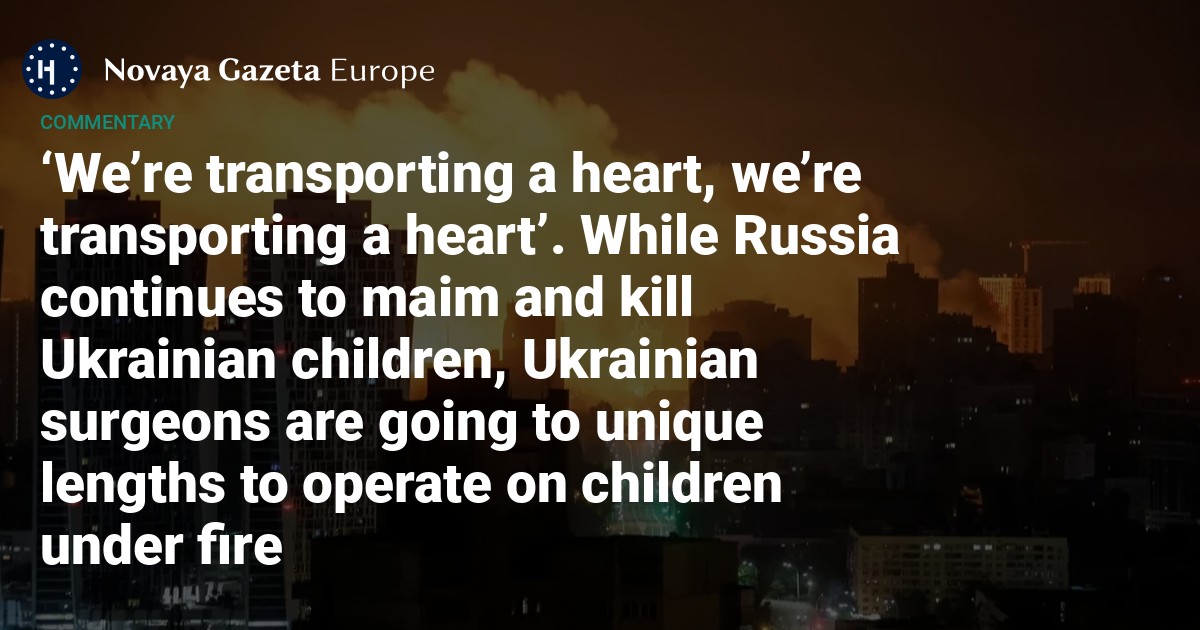



At 10am on 8 July 2024, the Russian army launched yet another air raid, firing about forty missiles of various types at Kyiv. The Russians probably fired on Kyiv that morning because they found their shelling the night before insufficient as not all military targets were hit.
At 10:42am, one of the rockets hit the toxicology building of the Okhmatdyt National Children’s Hospital, where dialysis was being performed. The blast blew out windows and doors, severely damaging the intensive care unit, operating theatres, the radiology department and the country’s only oncohematology laboratory.
Staff and parents managed to move most of the 627 patients, who ranged from newborns to teenagers, to a shelter before the attack, carrying them out in their arms or on gurneys, with IVs still attached. Media outlets published footage of rescuers, medics and ordinary citizens rummaging through the rubble as evacuated patients undergoing chemotherapy sat in the shade.
However, the attack occurred before the evacuation was complete and unfortunately, 50 children, who were still in the building at the time of the raid, were injured from flying broken glass. A baby, who was in intensive care at the time of the attack, died later that same day, after being transported to another hospital in Kyiv. Two adults were also killed: a doctor and a hospital visitor.
This was the first time in Todurov’s experience that parents had given permission for a child’s organs to be harvested and used as transplants.
One year has now passed. Okhmatdyt has been restored but the war continues with increasing brutality.
A year after the attack, in the early hours of 10 July, Kyiv was once again rocked by a record number of ballistic and drone strikes. Several people were killed, including a young policewoman and a Kyiv metro employee. Fires broke out on the streets, with several high-rise buildings damaged.
That night, Director of the Heart Institute and renowned cardiac surgeon Borys Todurov drove across Kyiv with a donor’s heart and a video of the organ transport was later posted on Facebook by journalist Violetta Kirtoka.
Rescue workers scour the rubble of the Okhmatdyt children’s hospital, struck by a Russian missile, Kyiv, Ukraine, 9 July 2024. Photo: Yevgeny Maloletka / AP Photo / Scanpix / LETA
The video is like an action movie. Cars on fire and the wreckage of a downed drone are visible on the side of the road, while the driver repeats to himself: “We are transporting a heart, we are transporting a heart”. There is also a video showing the organ transport arriving at the hospital, in which the unmistakable screeching of munitions overhead can be heard, while waiting for a small patient to arrive in the operating theatre.
Kirtoka revealed more about the story in an article for the Censor blog. According to Todurov, who has been working with the Okhmatdyt Children’s Hospital for “many years”, he arrived at the children’s hospital on 8 July to transport the heart of a four-year-old girl, who had died from a severe head injury. This was the first time in Todurov’s experience that parents had given permission for a child’s organs to be harvested and used as transplants.
“As we removed the heart, we heard explosions, and realised what was going on,” Todurov recalled. “But did we have a choice? We couldn’t just wait.”
Since Russia launched its full-scale invasion of Ukraine, fourteen successful child heart transplants were performed in Ukraine during air raids
As the surgeons worked, readying the heart for transport and transplant, a 12-year-old girl, who had already had surgery and had an artificial heart inserted as a temporary measure, was waiting.
“After we completed the operation, I got a call from my colleagues at Okhmatdyt. They told me a transplant was possible: the girl who died had the same blood type as our patient,” Todurov said.
The heart transplant surgery was successful, and the girl is currently in intensive care, undergoing a difficult recovery stage, the doctor continued. “But I hope everything will be fine,” he said.
Since Russia launched its full-scale invasion of Ukraine, fourteen successful child heart transplants were performed in Ukraine during air raids, in which donor organs cannot be transported via helicopter. Since the beginning of the war in Ukraine, Russia has damaged or destroyed 769 medical institutions, according to data from the Ukrainian Ministry of Health.
